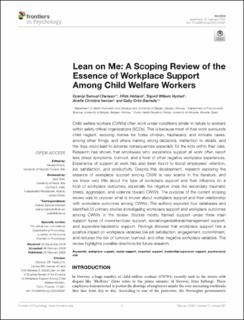| dc.description.abstract | Child welfare workers (CWWs) often work under conditions similar in nature to workers within safety critical organizations (SCOs). This is because most of their work surrounds child neglect, securing homes for foster children, haphazard, and intricate cases, among other things, and where making wrong decisions, inattention to details, and the likes could lead to adverse consequences especially for the kids within their care. Research has shown that employees who experience support at work often report less stress symptoms, burnout, and a host of other negative workplace experiences. Experience of support at work has also been found to boost employees’ retention, job satisfaction, and productivity. Despite this development, research exploring the essence of workplace support among CWW is very scarce in the literature, and we know very little about the type of workplace support and their influence on a host of workplace outcomes, especially the negative ones like secondary traumatic stress, aggression, and violence toward CWWs. The purpose of the current scoping review was to uncover what is known about workplace support and their relationship with workplace outcomes among CWWs. The authors explored four databases and identified 55 primary studies investigating workplace support and workplace outcomes among CWWs in the review. Studies mostly framed support under three main support types of coworker/peer support, social/organizational/management support, and supervisor/leadership support. Findings showed that workplace support has a positive impact on workplace variables like job satisfaction, engagement, commitment, and reduces the risk of turnover, burnout, and other negative workplace variables. The review highlights possible directions for future research. | en_US |

